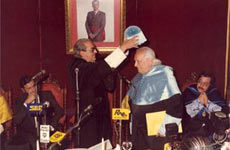Rafael Alberti Merello
| Doctor: | Rafael Alberti Merello |
| Proposal: | Faculty of Philosophy and Literature |
| Sponsor: | Prof. Dr. José Luis Tejada Peluffo |
| Celebration: | Faculty of Medicine 28th of April 1982 |

Born in El Puerto de Santa Maria, Rafael Alberti began his studies at San Luis Gonzaga College, where Juan Ramon Jimenez and Pedro Muñoz Seca had already studied. Nevertheless, in the year 1917 he had to leave his city and to move to Madrid. Here he devoted himself to learning to paint. Although he managed to exhibit some of his paintings and drawings, Alberti left this art aside when he discovered an even stronger vocation, poetry.
In 1920, he wrote his first poems, but it was not until 1924 that he published his first book, “Marinero en Tierra”, which earned him the National Literature Prize, shared with Gerardo Diego. At the Residencia de Estudiantes, Alberti met Federico Garcia Lorca, Salvador Dali, Luis Buñuel and other poets and artists of the generation of 27. In these years, he published La amante, El alba del alheli and participated in the homage to Gongora on the third centenary of his death. Romanticism and surrealism are mixed in Sobre los Angeles (1929), followed by Sermones y moradas and Elegia critica.
Then came the stage of “the poet in the street”, the “civil” poetry, which testified to his incipient political commitment: I was a fool and what I have seen has made me two fools and with shoes on I have to die 1930). He founded and directed the magazine Octubre with his companion Maria Teresa Leon. In 1931, he joined the Communist Party of Spain (of which in 1983 he would become briefly a deputy for Cadiz) and tried the avant-garde and committed theatre. Rafael Alberti studied recent European theatre thanks to a scholarship from the Board for Extension of Studies and during the year 1932 he travelled through Germany, France, Denmark, Russia, Norway, Belgium and Holland.
With the arrival of the Civil War, he was appointed secretary of the Alliance of Antifascist Intellectuals, a position that he combined with that of Director of the Romantic Museum and editor of the magazine El mono azul. In 1938, he went to Paris where he wrote Entre el clavel y la espada and Vida bilingüe de un refugiado español en Francia and began La arboleda perdida. Finally, he settled in Argentina where his work grew decisively, marked by the feeling of exile: Coplas de Juan Panadero, Retornos de lo vivo lejano and in theatre, El adefesio and Noche de guerra in the Prado museum. In 1963, he established his residence in Rome, a city that is evoked in the verses of Rome, peligro para caminantes (1968). In 1965, he received the Lenin Peace Prize. On the occasion of his return from exile in April 1977, poets from all over Spain dedicated a book of homage to him: Del corazon de mi pueblo, written in Castilian, Catalan, Galician and Basque.
Back in Spain, he published Abierto a todas horas (1979), Versos sueltos de cada dia (1982) and Versos para Altair (1988). In 1981, he was named Favourite Son of El Puerto de Santa Maria. A year later, the Ministry of Culture awarded him the National Theatre Award. In 1983, he received the Miguel de Cervantes Prize and was named Favourite Son of Andalusia. He entered the Royal Academy of Fine Arts of San Fernando in 1989, in recognition of his pictorial activity.
He died on October 27, 1999 in his native town of El Puerto de Santa Maria.

